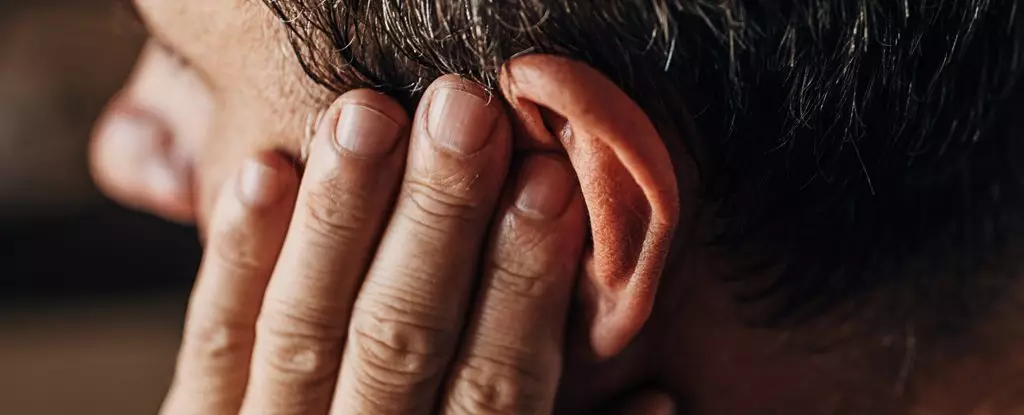Tinnitus, a condition characterized by hearing sounds like ringing or buzzing without any external auditory stimulus, affects approximately 15% of the global population. While it often occurs alongside hearing loss, the implications of tinnitus extend beyond mere auditory disturbances. The incessant sounds associated with this condition can significantly impact mental health, leading to heightened levels of stress, anxiety, and in some cases, debilitating depression. The lack of a definitive cure for tinnitus calls for innovative approaches in research, particularly concerning the relationship between tinnitus and sleep.
Recent studies are increasingly highlighting the significance of sleep in understanding tinnitus. Tinnitus is classified as a phantom percept, a term used to describe sensory experiences not rooted in external stimuli. This phenomenon typically arises during sleep; however, individuals with tinnitus encounter these auditory hallucinations while awake. This divergence raises fascinating questions about the underlying neurobiology of tinnitus.
Research suggests that tinnitus might be linked to heightened activity in specific brain areas associated with sound processing. This overactivity generates a persistent auditory perception, resulting in non-stop noise in the sufferer’s ears. Moreover, these brain circuits may exhibit altered behaviors during sleep, which also influences the overall experience of tinnitus.
Among the various stages of sleep, slow-wave sleep (SWS) stands out as crucial for cognitive and physical well-being. This phase is characterized by distinctive brainwave patterns, during which the brain engages large regions simultaneously, aiding in memory consolidation and the recuperation of brain cells from daily activity. SWS is predominantly pronounced in regions most active while awake, such as those facilitating motor skills and sight. However, disturbances during slow-wave sleep can manifest in individuals with tinnitus, potentially leading to disrupted sleep patterns.
People dealing with tinnitus often find themselves trapped in cycles of light sleep and frequent awakenings, which starkly contrasts with the deep restorative nature of quality sleep. It is hypothesized that certain hyperactive brain regions remain active during what should be restful periods, causing a range of sleep disturbances including nightmares and sleepwalking, increasing the overall fatigue and psychological stress for individuals affected by tinnitus.
The research delves deeper into how the brain’s activity during sleep may interact with tinnitus. Neurons are thought to shift to a slow-wave mode after extended wakefulness, facilitating recuperation. Remarkably, when critical mass is achieved in this neuronal mode, it could suppress the activity associated with tinnitus, offering a potential pathway for treatment. Furthermore, during the deepest stages of sleep, slow-wave activity may inhibit hyperactive regions from disrupting sleep processes.
Discovering why individuals with tinnitus, despite their disruptions, can still access deep sleep highlights an intriguing paradox. The deep sleep phase may serve as a reprieve from tinnitus noises, suggesting a unique interplay where sleep can assuage some symptoms temporarily.
The Importance of Sleep Quality for Tinnitus Management
Sleep quality plays a pivotal role in how individuals experience tinnitus. Neuroplastic changes during sleep could contribute to the duration and intensity of tinnitus following its onset, such as after an initial hearing loss. Understanding the dynamics of tinnitus through the lens of sleep may offer essential insights into how fluctuations in tinnitus can be managed.
One promising line of inquiry includes sleep restriction strategies designed to optimize sleep quality. For instance, encouraging patients to retire only when genuinely tired could enhance deep sleep duration, potentially diminishing tinnitus severity.
Moreover, it’s important to note that sleep is not a monolith—it consists of various stages, including REM sleep, each with unique neural characteristics that could influence tinnitus. Tracking brain activity in relation to these sleep stages may reveal more about how tinnitus intensity fluctuates and the role of each stage in maintaining neurological equilibrium.
As research in this field progresses, there lies a tantalizing prospect of developing multifaceted treatments that employ sleep management techniques to alleviate the symptoms of tinnitus. Understanding the intricate relationship between sleep and tinnitus could pave the way for innovative therapeutic strategies.
Future exploration may involve simultaneous tracking of tinnitus activity and sleep stages via advanced neuroimaging techniques. By investigating how various stages of sleep correlate with tinnitus experiences, researchers might unveil opportunities to harness natural brain processes to offer relief to individuals battling this challenging condition.
The emerging connection between sleep and tinnitus underscores a complex and multifaceted interaction that warrants continued investigation. While the journey toward understanding and treating tinnitus is far from complete, the intertwined nature of sleep and auditory perceptions presents a promising avenue for research and intervention.

